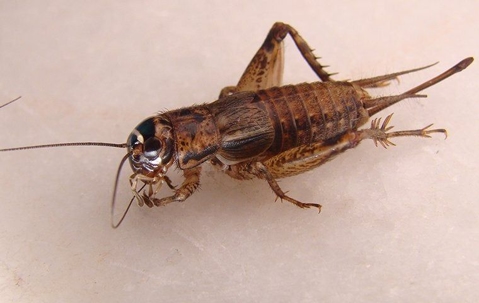As one of the more than 2,000 leaping insects from the order Orthoptera, crickets exist throughout the world. Crickets have wings and antennae, and males routinely make a “chirping” sound. From the family Rhaphidophoridae, camel crickets (Ceuthophilus spp.) are often called cave crickets or spider crickets. The camel cricket is a distinct creature from a “true” cricket.
Camel crickets often reside in caves or similar damp and cool settings beneath stones, fallen trees, and other types of vegetation. Found in many areas of the U.S., the life of camel crickets typically spans one to two years. Females generally lay eggs in the early spring months, which hatch sometime around April.
Camel crickets leap as a defensive tactic thanks to their long legs, such as when they encounter potential predators. They typically consume other insects, fungi, and plant material in natural outdoor environments. Inside a home, camel crickets might consume cardboard or fabrics found in curtains or clothing.
How do crickets make noise? “True” male crickets generate chirping sounds by using their forewings in a rubbing motion. Unlike most crickets, camel crickets lack wings and do not generate this sound.
Are you struggling with bothersome crickets? You should promptly consult with a Lawrenceville pest control company that knows how to get rid of crickets in yard areas and prevent these undesirable pests from returning.
How To Identify A Camel Cricket
The camel cricket’s name comes from its humpbacked appearance; however, most observers agree that it appears more like a spider. Their color ranges from light to dark brown, often with darker, banded markings. Camel crickets have six legs and long antennae. While their body itself usually measures three to four centimeters, including their legs, they reach ten centimeters (roughly four inches).
Do camel crickets bite? Camel crickets do not bite, sting, or spread diseases that harm humans. Considered a nuisance pest, camel crickets may damage fabrics, and their excrement creates stains.
What It Means If You're Seeing Camel Crickets In Your Home
Although camel crickets typically reside in outdoor environments, they may venture indoors during periods of extreme weather. Once indoors, camel crickets move toward dark and damp areas, including crawlspaces, basements, or laundry rooms.
Easy Ways To Prevent Camel Crickets In Your Home
Property owners should familiarize themselves with prevention strategies. Some of the best tips for how to keep crickets out of houses include:
- Limit unnecessary clutter near the home, particularly firewood and piles of debris.
- Fill any cracks or crevices near the base of the structure with a weather-resistant caulk or sealant.
- Install sweeps on exterior doors and apply weatherstripping around seals of windows if needed.
- Limit excessive moisture or humidity by repairing leaks and ensuring basements and crawlspaces have proper ventilation.
In many cases, camel crickets enter homes unintentionally or will initially enter an attached garage before entering the main part of the home.
Professional Pest Control Is A Great Way To Get Rid Of Camel Crickets
Home improvement stores and internet retailers often promote do-it-yourself products for treating crickets, including sprays, granular formulas, and sticky traps. The majority of these options generate very mediocre results. Contacting a local pest control company is the best way of responding to these problems.
As a local, family-owned company, Procare Pest Services delivers industry-leading customer service for clients in Lawrenceville. This customer-centric approach has led to continued organizational growth. In addition to crickets, our experts will oust ants, cockroaches, stinging insects, and other frustrating pests that infiltrate properties.
Our technicians conduct detailed inspections of the premises to identify the extent of the intrusion and any possible entry points. We also make recommendations regarding the best preventative measures. Contact our office today for a consultation.

